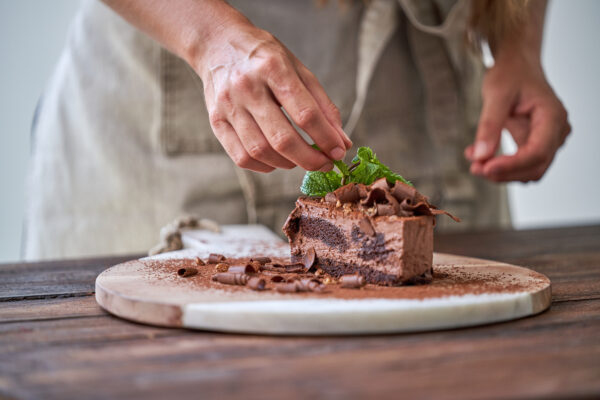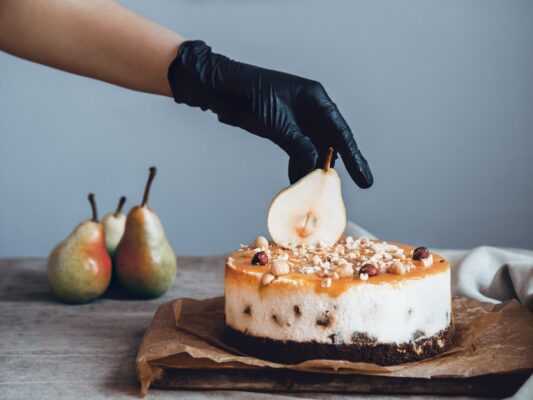What is a Pastry Chef?
A pastry chef specialises in the creation of desserts, pastries, and other sweet treats. Restaurants, bakeries, hotels, and other food service establishments typically employ pastry chefs. They are responsible for creating and preparing a variety of desserts, from simple cakes and cookies to elaborate tarts, mousse, and other confections.
The role of a pastry chef is highly creative and often involves a great deal of skill and artistry. Pastry chefs must have a deep knowledge of baking techniques and ingredients, as well as an eye for detail and a strong sense of flavour combinations. They may also be responsible for developing new dessert recipes and designing beautiful presentations for their creations. In addition to their culinary skills, pastry chefs must also be organised and able to manage their time effectively, as they often work in fast-paced and demanding kitchen environments.
What does a Pastry Chef do?

Pastry chefs are an integral part of the culinary industry, bringing their expertise and creativity to the creation of desserts, pastries, and baked goods. They not only create delicious and visually appealing desserts but also play a significant role in enhancing the overall dining experience.
A pastry chef’s skills in baking, decorating, and menu planning can make or break the success of a restaurant, bakery, or catering business. Additionally, they must stay up-to-date with the latest pastry techniques, ingredients, and trends.
Duties and Responsibilities
As a pastry chef, the duties and responsibilities include:
- Creating and developing pastry menus: A pastry chef must be skilled in developing new recipes and creating a diverse and appealing pastry menu for the establishment. They should consider customer preferences, seasonal ingredients, and budget constraints while planning the menu.
- Managing inventory and ordering supplies: The pastry chef is responsible for managing inventory levels of ingredients, tools, and equipment. They must ensure that all necessary supplies are ordered and available for the kitchen team.
- Preparing and baking pastry items: A pastry chef is responsible for baking and preparing a wide range of pastry items, including bread, cakes, pies, tarts, and desserts. They must ensure that all items are prepared and baked to perfection.
- Supervising the pastry team: The pastry chef is responsible for supervising and training pastry assistants and other staff members in the pastry kitchen. They must delegate tasks and ensure that all team members are working efficiently and effectively.
- Maintaining food safety and hygiene standards: A pastry chef is responsible for maintaining a clean and organised kitchen, following food safety regulations, and ensuring that all pastry items are prepared and stored properly.
- Creatively decorating pastry items: Pastry chefs must have artistic skills to decorate pastry items such as cakes, pastries, and desserts with beautiful and unique designs, such as sugar work, chocolate work, and piping.
- Interacting with customers: In some establishments, pastry chefs may interact with customers to take orders, explain pastry items, and receive feedback on the quality of the desserts.
- Continuously improving and staying updated: A pastry chef must stay updated with the latest pastry techniques, trends, and new pastry ingredients. They must continuously improve their skills and knowledge to remain competitive in the industry.
Types of Pastry Chefs
There are several types of pastry chefs, each with their own specialisation and expertise. Some of the most common types of pastry chefs include:
- Pastry Chef de Partie: This is the most common type of pastry chef, responsible for overseeing a particular section of the pastry kitchen. They are often in charge of preparing specific pastry items, such as cakes, cookies, or bread.
- Executive Pastry Chef: This is the head pastry chef of a restaurant, hotel, or bakery. They are responsible for overseeing the entire pastry department and ensuring that all pastry items are of the highest quality.
- Pastry Sous Chef: This is the second in command to the executive pastry chef and is responsible for assisting in the day-to-day operations of the pastry department. They often help to train new pastry chefs and ensure that all pastry items are of the highest quality.
- Cake Designer/Decorator: This type of pastry chef specialises in creating and decorating cakes for various occasions such as weddings, birthdays, and anniversaries. They often use specialised tools and techniques to create intricate designs and decorations.
- Chocolatier: A chocolatier is a pastry chef who specialises in working with chocolate, creating truffles, bonbons, and other chocolate-based confections. They have expertise in tempering chocolate and working with different types of chocolate.
- Baker: A baker is a pastry chef who specialises in making bread, rolls, and other baked goods. They often use traditional methods and techniques to create a variety of bread and pastry items.
What is the workplace of a Pastry Chef like?
The workplace of a pastry chef can vary depending on the type of establishment they work in. Pastry chefs can work in various settings, including restaurants, hotels, bakeries, cafes, and pastry shops.
In a restaurant or hotel, the pastry chef typically works in a separate pastry kitchen or station within the main kitchen. The pastry kitchen is usually well-equipped with ovens, mixers, work tables, and other specialised pastry equipment. The pastry chef may also have a team of assistants and pastry cooks to help them prepare desserts and pastries.
In a bakery or pastry shop, the pastry chef typically works in a retail setting, with the kitchen and the display area visible to customers. The pastry chef may interact with customers, take orders, and answer questions about the pastry items.
Regardless of the work setting, a pastry chef’s workplace can be fast-paced and demanding, requiring the ability to work under pressure and meet tight deadlines. The job can also be physically demanding, as pastry chefs are on their feet for long periods and may be required to lift heavy objects. Despite the challenges, the workplace of a pastry chef is often rewarding, with the opportunity to showcase their creativity and passion for baking and pastry-making.
Pastry Chef Skills
Pastry chefs need the following skills in order to be successful:
Creativity: A pasty chef uses creativity to develop new recipes and ideas for desserts. They also use creativity to create new ways to present classic desserts and make them unique. This can include using different ingredients, changing the presentation style or creating a new recipe.
Baking skills: Baking is the foundation of a career as a head pastry chef. Pastry chefs must have extensive knowledge of baking techniques and the ability to create a variety of baked goods. They must also be able to troubleshoot baking issues and develop new recipes.
Leadership: A pasty chef can use their leadership skills to motivate their team and ensure they complete their daily tasks. They can also use leadership skills to train new employees and help them develop their skills.
Communication: As a member of a kitchen team, it’s important for a pasty chef to communicate with their colleagues. They should be able to clearly convey their ideas and instructions to their team members. This can help to ensure that everyone is on the same page and working towards the same goals.
Organisation: A pasty chef needs to be organised to ensure they complete all of their tasks on time. They may also be responsible for managing the kitchen’s inventory and ordering new supplies when needed. Being able to keep track of ingredients, supplies and other resources is an important skill for a pasty chef to have.
The best jobs are never advertised. If you’re looking for the best deals, give us a shout. Send us your resume, cover letter, and a brief message outlining what job would make you happy.
Do You want to modernise the look of your CV?
Don’t have a cover letter? Here are some of the best tips on how to come up with one and a cover letter.
We list the best jobs in Ireland. Your dream jobs.


